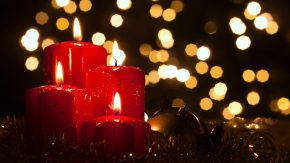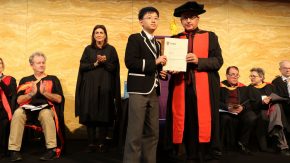Newingtonians at Beersheba and Gaza in 1917
The recent commemorations at Beersheba and our observance of Remembrance Day just eleven days later provide an opportunity to reflect on the sacrifices of Newingtonians in the Great War in places lesser known than Gallipoli and the Western Front.
At least five Newingtonians were serving in the 12th Light Horse Regiment at the time of its celebrated mounted charge, along with the 4th Light Horse, at Beersheba on 31 October 1917. Lieutenant Spencer Horden had entered Newington in 1906 and was farming in Nowra when he enlisted. Corporal Victor Nosworthy, at Newington from 1906 to 1908 and a member of the 1st XV for two years, was a stockman before the war. Trooper Colin Wells, a ropemaker from Cremorne, had entered the College in 1905, while his younger brother, Trumpeter Leyton Thorpe, a station overseer, had come to Newington in 1909. Trooper Harry Whyte, at Newington from 1905 to 1912, played in the 1st XI for four years and the 1st XV for three. Working as a clerk in Henty before the war, he was mentioned in despatches in 1918.
We don’t know for sure if any took part in the charge, but it is likely that at least some of them did. All appear to have returned to Australia safely at the end of the War.
Known officially as the South Palestine Offensive or the Third Battle of Gaza, and as ‘the November Stunt’ to the men, the offensive by British and Empire forces that started with Beersheba continued over the following week. It was in this fighting that two Newingtonians lost their lives.
Trooper Albert Edward Dawson, from Dulwich Hill, entered Newington in 1899, but otherwise we know little of his time at school. He was working on a farm when he enlisted in the 1st Light Horse Regiment late in 1915. Reported by his Corporal as “very popular with his mates”, he was wounded at Tel el Khulweife on 3 November 1917 while helping to carry a wounded comrade back from the firing line. He died in the military hospital at Beersheeba the next day, aged thirty-three.
Chaplain-Captain William James Dunbar had come to Newington as a ‘divinity student’ — until 1914, the College housed a small Methodist seminary, the students of which were part of the Newington community — completing his studies in 1910. He served in the Methodist ministry in several country locations before enlisting, aged thirty-five, in 1915. Having served as a Trooper in the Light Horse for nearly two years, he was appointed a Chaplain in May 1917 and posted to the 11th Light Horse.
At Sheria on 7 November, after a mounted charge, some members of this regiment were caught in the Turkish lines and most were killed or wounded. A wounded trooper named Foster attempted to return under fire to the Australians’ line. An eyewitness reported: “Padre Dunbar … and the stretcher bearer made a run for it. They reached the trooper and raised his shoulders. Simultaneously the three were hit.”
Dunbar, Foster and eleven comrades were buried the next day and the regiment cleaned the grave and erected a cross when they returned some months later, following the capture of Jerusalem.
David Roberts
College Archivist






